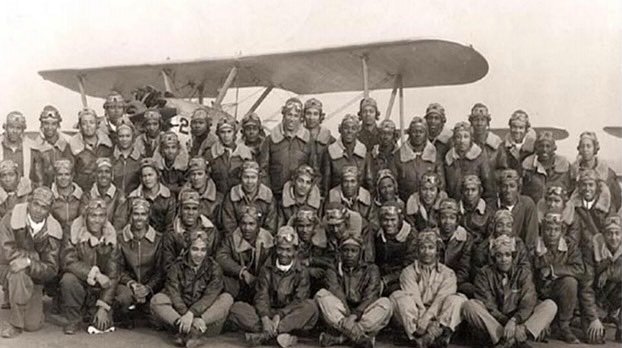#FlashbackFriday: Remembering the Tuskegee Airmen

In honor of Black History Month, we remember the Tuskegee Airmen, the first Black military aviators in the U.S Army Air Corps, now known as the U.S Air Force. Young Black Americans who aspired to become pilots met with significant obstacles, such as the widespread belief that African-Americans could not learn to fly or operate sophisticated aircraft.
However, in 1940, President Roosevelt announced that the military would begin training African-American pilots. Training took place at Tuskegee Army Air Field in Tuskegee, Ala. program trained around 1,000 pilots and nearly 14,000 navigators, bombardiers, instructors, aircraft and engine mechanics, control-tower operators and other maintenance and support staff.
The Tuskegee Airmen flew more than 1,200 missions. After the Airmen returned home, they continued to face racism and prejudice. However, they did represent a crucial step forward in preparing the nation for the racial integration of the military. In 1948, President Truman issued an executive order mandating the desegregation of the Armed Forces.
On March 29, 2007, President Bush announced that Congress would award the Congressional Gold Medal to the Tuskegee Airmen. The ceremony was attended by 300 representatives from the 16,000-19,000 men and women who were part of the Tuskegee Experience of World War II. Among those in attendance were documented original Tuskegee Airmen.
Former Tuskegee Airmen have made visits to several Exchanges. In February 2012, Lt. Col. Herbert Carter, one of the original Tuskegee Airmen, greeted shoppers and associates at the Fort Rucker Exchange—about 90 miles from Tuskegee—during the release of “Red Tails,” a movie about the Airmen.
Few of these heroes are left; Carter died just months after his Fort Rucker visit. On Jan. 16, retired Brig. Gen. Charles McGee died at 102; obituaries referred to him as one of the last surviving Tuskegee Airmen and noted that he flew a total of 409 missions during World War II and the Korean and Vietnam Wars. According to Tuskegee Airmen Inc., on Dec. 6—the day before his 102nd birthday—McGee toured the 99th Flying Training Squadron at Joint Base San Antonio-Randolph to see how the 99th Fighter Squadron, the first Tuskegee Airmen squadron, had evolved.
For more about the Tuskegee Airmen, click here.
Sources: deomi.org, tuskegeeairmen.org, Exchange Post archives, trumanlibrary.org
Exchange historian Robert Philpot contributed to this report.

